

Slide What does YOUR School Focus On? Technology is a Tool. How Do Schools Get Tech R.I.G.H.T.? Technology transforms the world in which we live.

It can make the impossible possible and is the key to doing more with less. Yet many school leaders are apprehensive about bringing technology into their school, much the way the fellow in this clip fears one of his first sightings of snow: New Tech City: Screens and Kids: Do Techies Have Different Rules than the Rest of Us? In a world of screens, parents face some tough questions: To limit or not to limit?
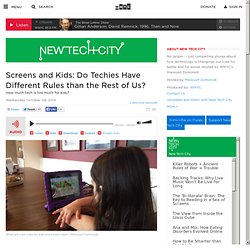
By how much and when? How different is Candy Crush from Codeacademy? And what is all the new tech doing to our children? In this episode, we dive into the conundrum with the techies themselves -- the parents who code the apps and create the devices on your desk or in your pocket. We want to find out if they know something the rest of us civilians don’t. We’ll hear from Sameer Ajmani, a Google software engineer, who deployed some evidence-based parenting and experimented with screen time extremes for his seven year-old.
“The reality is that [tech execs] actually have a better understanding of where tech can go wrong than most non-tech parents do,” Nick Bilton. Nick Bilton, tech columnist for the The New York Times, joins Manoush to swap stories after informally surveying tech execs in Silicon Valley about their family rules. Media and Children. Media is everywhere.
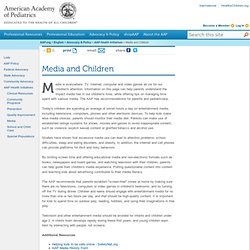
TV, Internet, computer and video games all vie for our children's attention. Information on this page can help parents understand the impact media has in our children's lives, while offering tips on managing time spent with various media. The AAP has recommendations for parents and pediatricians. Today's children are spending an average of seven hours a day on entertainment media, including televisions, computers, phones and other electronic devices.
To help kids make wise media choices, parents should monitor their media diet. Studies have shown that excessive media use can lead to attention problems, school difficulties, sleep and eating disorders, and obesity. Should teachers be using social media in the classroom? Photo by David Paul Morris/Bloomberg via Getty Images Editor’s note: About once a month, the NewsHour’s editorial staff huddles in our conference room to brainstorm ideas for “theme weeks” where we explore a single topic from all different — and sometimes surprising — angles.
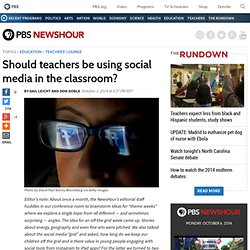
The idea for an off-the-grid week came up. Stories about energy, geography and even fine arts were pitched. Technology in Education. 8 Important Questions About Technology and Learning. There are so many different challenges that technology integration in the classroom presents teachers.
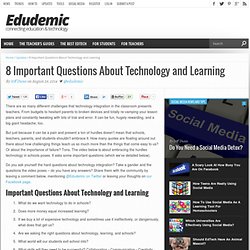
From budgets to hesitant parents to broken devices and totally re-vamping your lesson plans and constantly tweaking with lots of trial and error. It can be fun, hugely rewarding, and a big giant headache, too. But just because it can be a pain and present a ton of hurdles doesn’t mean that schools, teachers, parents, and students shouldn’t embrace it. It's not 1989. I saw this online the other day.
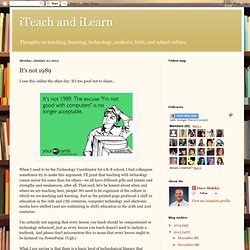
It's too good not to share... When I used to be the Technology Coordinator for a K-8 school, I had colleagues sometimes try to make this argument. I'll grant that teaching with technology comes easier for some than for others--we all have different gifts and talents and strengths and weaknesses, after all. That said, let's be honest about when and where we are teaching here, people!
We need to be cognizant of the culture in which we are teaching and learning. I'm certainly not arguing that every lesson you teach should be computerized or technology enhanced, just as every lesson you teach doesn't need to include a textbook. What I am saying is that there is a basic level of technological literacy that should be a prerequisite for all teachers today. The question is, what would constitute this level of tech savvy?
In a nutshell, here are the skills and attitudes I would suggest: Every teacher must have a basic computer literacy. That's my list. There’s no app for good teaching. 8 ways to think about tech in ways that actually improve the classroom.
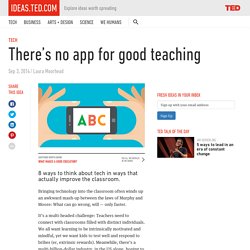
Bringing technology into the classroom often winds up an awkward mash-up between the laws of Murphy and Moore: What can go wrong, will — only faster. It’s a multi-headed challenge: Teachers need to connect with classrooms filled with distinct individuals. We all want learning to be intrinsically motivated and mindful, yet we want kids to test well and respond to bribes (er, extrinsic rewards). Meanwhile, there’s a multi-billion-dollar industry, in the US alone, hoping to sell apps and tech tools to school boards. There’s no app for that. But there are touchstones for bringing technology into the classroom. “App-transcendence,” says Howard Gardner, a professor at Harvard’s graduate school of education who is known for his theory of multiple intelligences, “is when you put the apps away and use your own wits, not someone else’s.” 1.
Www.iste.org/docs/pdfs/netsessentialconditions.pdf?sfvrsn=2&utm_source=buffer&utm_campaign=Buffer&utm_content=buffer3a0ad&utm_medium=twitter.